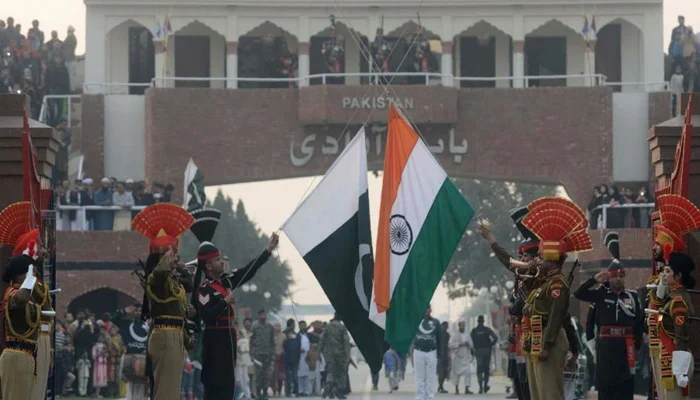Pakistan, India exchange lists of nuclear installations, prisoners
The foreign affairs ministry handed the list over to a representative of the Indian High Commission in Islamabad
ISLAMABAD: Pakistan and India have officially exchanged the lists of their nuclear installations and facilities, the Foreign Office announced here on Monday.
The foreign affairs ministry handed the list over to a representative of the Indian High Commission in Islamabad.
Simultaneously, the Indian External Affairs Ministry handed the list of their nuclear installations and facilities over to a representative of the Pakistan High Commission in New Delhi, the Foreign Office said.
The Agreement on Prohibition of Attacks against Nuclear Installations and Facilities, which provides that both the countries shall inform each other of their nuclear installations and facilities, falling within its definition, on January 1 of each calendar year, still holds decades after it was signed in Islamabad on December 31, 1988.
The agreement was signed by the then foreign secretary Humayun Khan and his Indian counterpart K.P.S. Menon.
The agreement took force on January 27, 1991, which sees the two countries exchanging their lists since 1st January 1992.
The information exchanged on Monday included, according to the agreement, the latitude and longitude of nuclear installations and facilities and whenever there is any change. The term “nuclear installation or facility” includes nuclear power and research reactors, fuel fabrication, uranium enrichment, isotopes separation and reprocessing facilities as well as any other installations with fresh or irradiated nuclear fuel and materials in any form and establishments storing significant quantities of radio-active materials.
The 1988 agreement reaffirms the two countries commitment to durable peace and development of friendly and harmonious bilateral relations; conscious of the role of confidence building measures in promoting such bilateral relations based on mutual trust and goodwill.
Both countries agreed to refrain from undertaking, encouraging or participating in, directly or indirectly, any action aimed at causing the destruction of, or damage to, any nuclear installation or facility in the other country. Meanwhile, in an unrelated statement, the Foreign Office condemned the Indian authorities decision to declare Tehreek-e-Hurriyat Jammu and Kashmir (TeH) as an “unlawful association”, for five years.
“The TeH is the second Kashmiri party banned under the Unlawful Activities (Prevention) Act (UAPA) in less than a week’s time. With its banning, the total number of outlawed Kashmiri political parties increases to six.
“The party was founded by iconic Kashmiri leader, Syed Ali Shah Geelani, who passed away in 2021 during a protracted house arrest. His body was ruthlessly snatched by the occupation authorities, and his near and dear ones were not allowed to attend his funeral”, said the Foreign Office.
Banning of political parties is part of India’s relentless campaign, underlined the Foreign Office in an attempt to subjugate the Kashmiri people, suppress dissent, and consolidate its occupation of Indian Illegally Occupied Jammu and Kashmir (IIOJK). “These actions blatantly violate democratic norms and international human rights and humanitarian law. India must remove the ban on all the political parties illegally outlawed in IIOJK; respect the fundamental rights and freedoms of the Kashmiri people; release all the political prisoners and dissenters; and faithfully implement the UN Security Council resolutions on Jammu and Kashmir”, demanded the Foreign Office.
Foreign Office also announced Pakistan and India exchanged the lists of prisoners in each other’s custody through diplomatic channels.
-
 Sarah Ferguson, Shamed Andrew Spotted In ‘family Costume Drama’
Sarah Ferguson, Shamed Andrew Spotted In ‘family Costume Drama’ -
 Kylie Kelce Reveals Why She Barely Planned Her Wedding Day?
Kylie Kelce Reveals Why She Barely Planned Her Wedding Day? -
 Why Shamed Andrew Called His Victims ‘Mrs Windsor’
Why Shamed Andrew Called His Victims ‘Mrs Windsor’ -
 Kate Hudson Explains Why Acting Isn't Discussed At Home
Kate Hudson Explains Why Acting Isn't Discussed At Home -
 Prince William, Kate Middleton Epstein Statement Was AI Generated, Says Expert
Prince William, Kate Middleton Epstein Statement Was AI Generated, Says Expert -
 Sarah Ferguson On Her Way To Hurt 'only Two People Who Care About Her'
Sarah Ferguson On Her Way To Hurt 'only Two People Who Care About Her' -
 World’s Top PC Maker Sounds Alarm Over Memory Chip Shortage
World’s Top PC Maker Sounds Alarm Over Memory Chip Shortage -
 King Charles Is ‘clearly Worried’ Andrew Has Tarnished Royal Image
King Charles Is ‘clearly Worried’ Andrew Has Tarnished Royal Image -
 Royal Family Loses 'loyal' Worker After King Charles Disliked His Work?
Royal Family Loses 'loyal' Worker After King Charles Disliked His Work? -
 James Van Der Beek's Quiet Sacrifice Before Death Comes To Light
James Van Der Beek's Quiet Sacrifice Before Death Comes To Light -
 Suspect Kills Six Across Florida Before Taking His Own Life
Suspect Kills Six Across Florida Before Taking His Own Life -
 AI Helps Researchers Identify 2,000-year-old Roman Board Game Stone
AI Helps Researchers Identify 2,000-year-old Roman Board Game Stone -
 Inside Kate Middleton, Prince William’s Nightmare Facing Andrew Mountbatten-Windsor
Inside Kate Middleton, Prince William’s Nightmare Facing Andrew Mountbatten-Windsor -
 Margaret Qualley Shares Heartfelt Confession About Husband Jack Antonoff: 'My Person'
Margaret Qualley Shares Heartfelt Confession About Husband Jack Antonoff: 'My Person' -
 Savannah Guthrie Shares Sweet Childhood Video With Missing Mom Nancy: Watch
Savannah Guthrie Shares Sweet Childhood Video With Missing Mom Nancy: Watch -
 Over $1.5 Million Raised To Support Van Der Beek's Family
Over $1.5 Million Raised To Support Van Der Beek's Family




